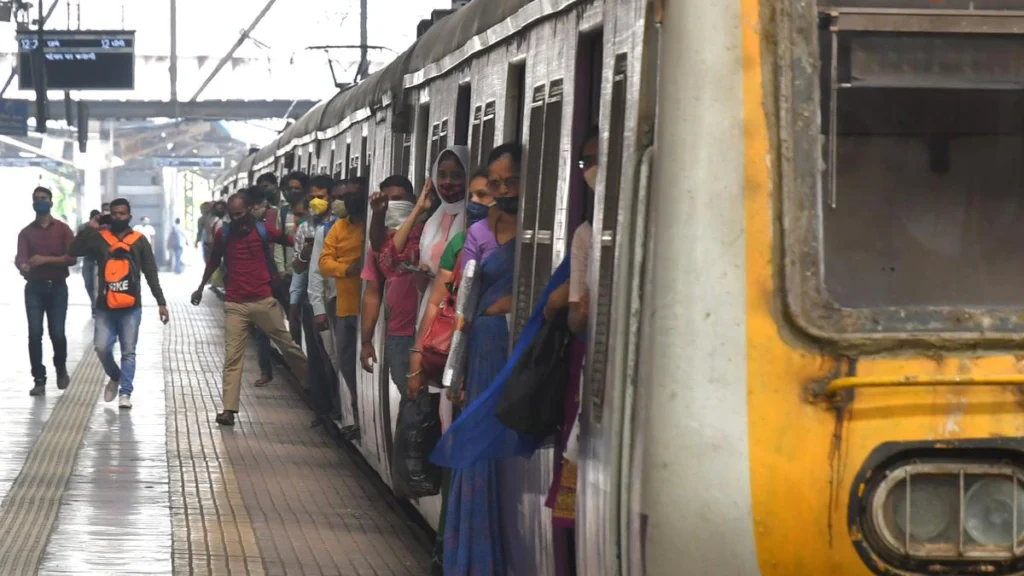Mumbai train accident: Five dead after falling off local train due to overcrowding

Mumbai Train Accident: Overcrowding Claims Five Lives Near Mumbra
In a deeply distressing incident, five commuters lost their lives after falling off a packed local train headed to Chhatrapati Shivaji Maharaj Terminus (CSTM) near Mumbra, on Tuesday morning. The accident has once again shed light on the severe overcrowding problems that plague Mumbai’s lifeline — its local train system.
A Usual Commute Turns Fatal
For millions of Mumbaikars, local trains are not just a mode of transportation; they’re a daily necessity. Every day, people cram into these trains to reach their workplaces, schools, and homes. On June 4, 2025, this daily routine turned tragic for at least five individuals when they fell off a train due to severe overcrowding between Diva and Mumbra stations on the Central Line.
According to eyewitnesses, the train was packed well beyond capacity during peak morning hours. As the train picked up speed, several commuters who were standing at the edge of the coach’s doorway lost balance and fell onto the tracks. While some were critically injured, others died instantly.
Emergency Response and Investigation
The railway administration, along with Thane Government Railway Police (GRP) and RPF (Railway Protection Force), quickly arrived at the scene. Emergency services rushed the injured passengers to nearby hospitals, including Kalwa and Civil Hospital in Thane.
Railway authorities are now reviewing CCTV footage and passenger testimonies to determine the exact cause of the fall. Initial reports indicate that the victims were hanging at the edge of the coach, a common sight in Mumbai’s overcrowded suburban trains, especially during rush hours.
A spokesperson for the Central Railway said, “We deeply regret the loss of lives. We are working with the local police and our internal teams to conduct a thorough investigation into the matter.”
Victims and Impact
Among the deceased are two young professionals, a college student, and two daily wage workers. Their families, who gathered outside the hospitals and railway offices, expressed shock and grief, blaming the lack of safety measures and inadequate number of trains during peak hours.
One of the victim’s relatives, Anand Patil, said, “He was only 24, going to his first job. He used to avoid the rush by catching an earlier train, but today he was a little late. This system failed him.”
A Recurring Problem
This is not the first time overcrowding on Mumbai’s local trains has led to fatalities. According to a recent report by the Mumbai Railway Vikas Corporation (MRVC), more than 2,000 people die annually due to various causes on the suburban rail network, with many deaths linked to overcrowding and track-crossing.
Rail activists and commuter groups have been raising alarms for years about the dangerously packed trains and the urgent need for systemic reforms.
Subhash Gupta, a long-time rail activist, stated, “We have been demanding additional services, longer trains, and better crowd management for years. Nothing meaningful has been done. Until authorities treat commuter safety as a priority, these accidents will continue.”
Need for Infrastructure Upgrades
Mumbai’s suburban rail network, while essential, is burdened far beyond its designed capacity. During peak hours, trains often carry more than three times their recommended passenger limit. Projects like the Mumbai Urban Transport Project (MUTP) and the introduction of AC local trains are underway but far from sufficient to address the growing demand.
Experts suggest that the railway system needs immediate infrastructure expansion — including more platforms, increased train frequency, upgraded signaling systems, and faster completion of long-pending projects like the elevated suburban corridor.
Government and Public Reaction
In the wake of the incident, public outrage has grown on social media platforms. Hashtags like #FixMumbaiTrains and #TrainSafetyNow began trending by late Tuesday afternoon. Several users shared their daily struggles, photos of packed compartments, and calls for accountability.
Opposition leaders have also criticized the state and central government, demanding compensation for the victims’ families and urgent action to prevent further tragedies.
Maharashtra Chief Minister assured a compensation of ₹5 lakh each to the families of the deceased and promised a detailed inquiry. He also instructed the transport department to submit a safety report within 15 days.
Railway Minister Ashwini Vaishnaw expressed his condolences and promised that safety audits would be intensified across suburban networks. “We are committed to improving the safety and comfort of every passenger. This tragedy is unacceptable and must not repeat,” he said.
A Harsh Reminder
This tragic incident is a grim reminder of how a bustling metropolis like Mumbai, with its ambitious infrastructure dreams, still struggles to offer a safe daily commute to its citizens. For many, the day began like any other — until routine turned into ruin.
The lives lost serve as a call for urgent reforms. The rail network that powers the city needs more than just patchwork solutions. It requires bold decisions, long-term investments, and accountability at every level.
As Mumbai mourns, the question remains: how many more must fall before systemic changes are made?






